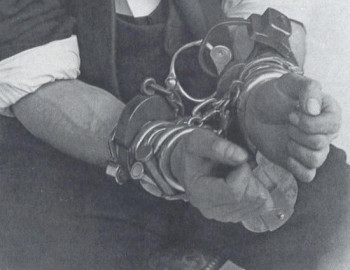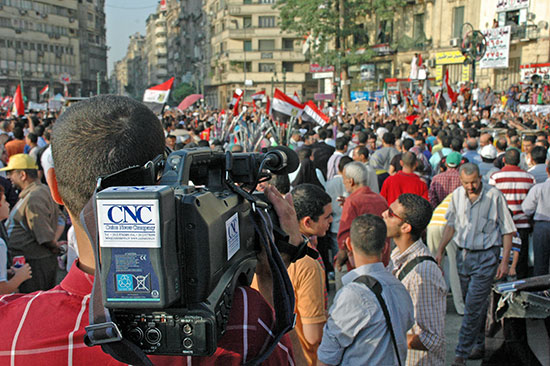
The sentencing of Al Jazeera journalists, Mohamed Fahmy, Peter Greste and Baher Mohamed to seven to ten years in Egyptian prison erupted across front page news headlines throughout the world. Photo: Front page of New York Times, June 24 2014 (highlights by iMediaEthics)
CAIRO, Egypt– Network Flouted Laws While Supporting Radical Groups Inside Egypt, Endangering Safety of Three Journalists Now Held Captive
Al Jazeera English always tried to work separately from its sister Arabic channel to avoid trouble with Egyptian authorities.
This paid off, as the English channel resumed operation even when the Al Jazeera Arabic channel’s offices in the same building were raided and shut down in July 2013.
Al Jazeera English resumed operation until authorities discovered that the Al Jazeera Arabic was using Al Jazeera English to air footage filmed in Egypt. One of these stories was a report by Nicole Johnson, Al Jazeera English correspondent, on the social help Muslim Brothers were giving to Alhagana village near Cairo. This report was dubbed into Arabic and broadcasted at Al Jazeera Mubasher Misr, considered a pirate broadcasting channel in Egypt. Authorities raided the office of Al Jazeera English, and confiscated computers and a camera in September 2013.
I have been providing transmission and live studio facilities in Cairo to Al Jazeera English since its launch in 2006. In 2008, when I transmitted the hunger demonstrations at the delta of Egypt for them, police raided my office and confiscated the equipment. I endured a trial for 14 months and faced the threat of fines as well as three years of prison. So when the police raided the Al Jazeera English offices, I was surprised at how strange their inaction and reactions were in light of my prior experience.
————————————————————————————————————–
This commentary is part of iMediaEthics’ Investigative series on international media reporting on Egypt. iMediaEthics’ editor-in-chief and publisher, Rhonda Roland Shearer, spent much of May and June in Egypt reporting for this series. She worked with Nader Gohar and his CNC team to produce video reports for iMediaEthics. Arabic Version of this story found on Almorakib.com Go to Main Investigation>
————————————————————————————————————–
During the raid, Abdullah Mussa, who is credited at the Egyptian State Information Services as the head of Al Jazeera English channel was not present. Yet on the same day, he decided to fly to Doha, the capital city of Qatar, without informing anyone rather than remain in Cairo to face the authorities.
Mussa should have immediately filed a complaint at the Egyptian State Information Service from which Al Jazeera English has permits and operates under its auspices. He should have hired a lawyer and demanded the return of his equipment instead of escaping to Doha, especially since authorities confiscated some equipment but did not arrest any of the staff.
The situation became more complicated when a lawyer sent by Al Jazeera Arabic confirmed to Egyptian authorities that the two channels operated as a single entity, contradicting the previous notion that the English channel worked separately, and confirming that the two had cooperated in illegal ways.
Two months after Al Jazeera’s Cairo offices were shut down, Mohamed Fahmy, a producer and journalist who worked for CNN and later moved to Al Jazeera English, dropped by my office and told me that the channel would resume its operations from the Intercontinental Hotel. I immediately advised him to go to the Cairo Press Center and inform the authorities of his presence in Egypt.

Nader Gohar, co-owner of Cairo New Company (CNC) rents studio and office space to Al Jazeera and they often hired his cameramen. CNC sometimes covered demonstrations for Al Jazeera English.
I also suggested that he explain to the Egyptian authorities that he was here to resolve any issues between the two sides and to clarify that the English channel’s editorial department operates separately from the Arabic channel. I pointed out that it is virtually impossible to work in secrecy and that the local authorities would soon discover his presence. I told him to ask authorities for filming permits covering positive events such as the referendum and the roadmap. I even told him to go to the authorities and demand the equipment that they confiscated and negotiate the reopening of the channel’s offices. Fahmy seemed apprehensive but gave me the impression that he would do as I advised him.
In the end, however, he did not follow my advice– I believe due to disapproval by the channel’s Doha management.
What you need to know
The Al Jazeera channel launched in 1996, at a time when Arab TV news was constrained to showing the great accomplishments of His Royal Highness (the Emir of Qatar) or His Excellency the President (Hosni Mubarak). Al Jazeera’s launch coincided with the shutting down of the BBC Arabic channel, as Saudi Arabia had stopped funding it after the channel had aired news about Saudi dissident Mohamed Al Massari. Al Jazeera was quick to hire the experienced staff that left BBC Arabic, and the channel swiftly won the admiration of Arab viewers and became their leading source of news.
In 2003, the Emir of Qatar replaced Al Jazeera Chief Mohamed Jassim, a young Qatari who studied media in Egypt, with Wadah Khanfar, a Palestinian originally from Gaza. Khanfar has strong ties to the radical Islamic group, Hamas, a group connected with the Egyptian terrorist organization the Muslim Brotherhood. At this point, Qatar started using the channel politically. It was widely believed that they used it in revenge against the ruling regimes in Egypt and Saudi Arabia for standing up for the ruler of Qatar when his son Sheikh Hamad held a coup and took over power in 1995.
The large quantity of biased and sometimes blatantly incorrect information that was then broadcast resulted in Al Jazeera losing many of its Arab viewers. Egyptians boycotted the channel and some even prevented its journalists from filming on the street. Egyptian journalists also started boycotting any press conferences attended by Al Jazeera correspondents in Egypt. Following a series of police raids on Al Jazeera’s offices, authorities shut down the channel for its support of the banned Muslim Brotherhood, which Egypt labeled as a terrorist group in December 2013.
Despite all this, the Al Jazeera English channel enjoyed complete freedom and operated from Cairo. Sanctioned by the Egyptian State Information Service, its staff carried approved press cards until 2013.
The situation deteriorated further when operations shifted between two hotels, the Intercontinental and the Marriott, in an attempt to maintain disguise. In December, there came a chance to register any foreign journalists through the Egyptian Press Office. Instead of Fahmy registering himself and the reporters from Doha, two Egyptian cameramen and a “tea and coffee office-worker were registered instead.
Within the Marriott Hotel, the office of Al Jazeera English grew and soon followed in the footsteps of Al Jazeera Arabic. They hired Baher Ghorab, who denies being a member of the Muslim Brotherhood, but whose father was. More Muslim Brotherhood members were seen at the Marriott Hotel, but Egyptian authorities kept a close eye and arrested them. They were accused of working without permits, bringing in banned communications equipment, and cooperating with a banned terrorist group.
With the start of the trial, Heba Allen, vice chief editor of Al Jazeera English, and Tamara Barbu, the head of the security at the channel, arrived in Egypt to consult lawyers and support those accused. I suggested a savvy lawyer who previously acquitted me from accusations of operating without permits during the hunger riots in 2008. They did not take my advice.
The lawyer assigned by Al Jazeera, Farag Fathy Farag, asked the network to halt all lawsuits filed by Al Jazeera outside Egypt. He also asked them not to link the court case with politics or any other issues that concern Al Jazeera Arabic, as this would not be in favor of those accused. But Al Jazeera retaliated by dismissing the lawyer, and continued with the $150 million lawsuit. During Farag’s last court session, he announced his resignation from the case and accused Al Jazeera of using the lawsuit to push their political agenda, which does not favor the defendants.
In the end, it is our fellow journalists, Mohamed Fahmy, Peter Greste and Baher Mohamed, who are suffering oppression and maltreatment in captivity. Mohamed Fahmy is apparently in need of medical treatment. Peter Greste, an Australian journalist who came here to Cairo to do his job, has found himself the victim of political differences in addition to judicial and bureaucratic obstacles that have prevented him from returning to his family.
Nader’s 17 Reasons Why Al Jazeera English Journalists Unfairly Sit in Prison:
1. During the raid on Dec. 29, 2013, the head of Al Jazeera English channel, Abdullah Mussa, was not present. But on the same day, he decided to fly to Doha without informing anyone, instead of remaining in Cairo to face the authorities.
2. Mussa should have immediately filed a complaint at the Egyptian State Information Service, from which Al Jazeera English has permits and operates under its auspices.
3. He should have hired a lawyer and demanded back his equipment instead of escaping to Doha, especially since authorities confiscated some equipment but did not arrest any of the staff.
4. The situation became more complicated when a lawyer sent by Al Jazeera Arabic confirmed to Egyptian authorities that the two channels operated as a single entity; disclaiming what was previously thought that the English channel worked separately, and confirming that the two had cooperated in illegal ways. Originally, Al Jazeera English worked separately from its sister Arabic channel to avoid trouble with Egyptian authorities. I told them numerous times to stop transmitting material to the AJ Arabic channel
5. Two months after Al Jazeera’s Cairo offices were shut down, Mohamed Fahmy, a producer and journalist who worked for CNN and later moved to Al Jazeera English, dropped by my office and told me that the channel would resume its operations from the Intercontinental Hotel. I immediately advised him to go to the Cairo Press Center and inform the authorities of his presence in Egypt.
6. I also suggested that he explain to the Egyptian authorities that he is here to resolve any issues between the two sides and clarify that the English channel’s editorial department operates separately from the Arabic channel.
7. I pointed out that it is virtually impossible to work in secrecy and that the local authorities would soon find out of his presence.
8. I told him to ask authorities for filming permits covering positive events such as the referendum.
9. I even told him to go to the authorities and demand the equipment that they confiscated and negotiate the reopening of the channel’s offices. He seemed apprehensive but gave me the impression that he would do as I advised him. Then in the end, he did not follow my advice; I believe due to disapproval by the channels management in Doha.
10. The situation deteriorated further when AJE operations shifted between two hotels [Marriott and Intercontinental] in an attempt to maintain disguised.
11. Then in December, there was a chance to register any foreign journalists through the Egyptian Press Office, but instead of registering himself and the reporters from Doha, two uninvolved Egyptian cameramen were registered instead. (The tea and coffee boy [low-ranked office worker] is transformed into a “sound man” in the letter sent to the Press Center that the cameraman–not any administrative authority for the channel, insisted go out with his name. (See letter that AJ English submitted to the Press Centert).
12. Within the Marriott Hotel, the office of Al Jazeera English grew, then soon followed in the [troubling] footsteps of Al Jazeera Arabic and hired Baher Ghorab, a member of the Muslim Brotherhood, and whose father was head of one of the radical Islamic channels. More Muslim Brotherhood members were seen at the Marriott Hotel, but Egyptian authorities kept a close eye, arrested them, and accused them of working without permits, bringing in banned communications equipment, and cooperating with a banned terrorist group.
13. Heba Allen and Tamara Barbu from the network arrived in Egypt to consult lawyers and support those accused. I suggested a savvy lawyer who previously acquitted me from accusations of operating without permits when the residents of Mahalla brought down Mubarak’s picture during the hunger riots in 2008 [They did not take my advice].
14. In the court, the lawyer assigned by Al Jazeera [Farag Fathy Farag] asked the network to halt all lawsuits filed by Al Jazeera outside Egypt. He also asked not to link the court case with politics or any other issues that concern Al Jazeera Arabic, as this is not in favor of those accused in this case. [They did not take his advice]
15. But Al Jazeera retaliated by dismissing the lawyer. In his last court session, he announced his resignation in the case and accused Al Jazeera of using the lawsuit to push their political agenda, which does not favor the defendants.
16. Al Jazeera broke Egyptian laws– they created a TV channel with no paperwork!
17. In the end, the facts suggest the journalists took the fall for the failed inactions and judgement of their employer.
Editor’s Note: Al Jazeera declined to respond to fact check questions about Gohar’s commentary despite iMediaEthics’ numerous requests by email and phone. Go to the main story in this series to learn more.

MORE RELATED TO THIS STORY
- Al Jazeera accused of money laundering [Main Story]
- Pirates? Al Jazeera Had No Licenses
- Al Jazeera Paid Protesters Cash
- Marriott Raid: Police Interrogation







Comments Terms and Conditions